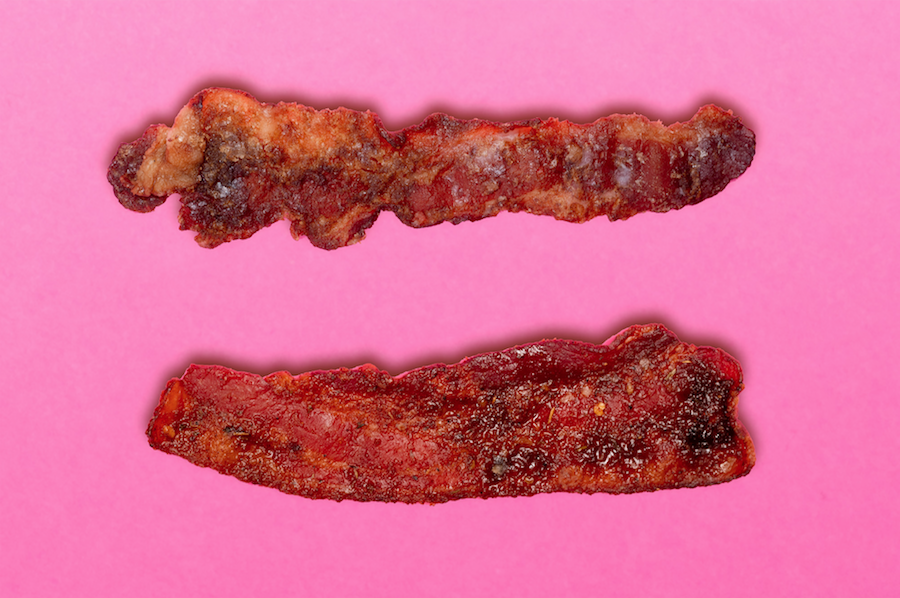Bacon and eggs— The phrase just rolls off the tongue like a single word. Maybe it ought to be hyphenated by now, like this: bacon-and-eggs. Or, perhaps squeezed together like four kids into the backseat of a station wagon: baconandeggs. The point is, the combination of bacon and eggs exists as a monolith in American cuisine—an immovable object like apple pie or mac-and-cheese. Even today, as bacon makes its way into weird places like cocktails, candles and candy, the fatty strips of pork belly are difficult to separate from their cozy spot next to eggs. But, like so many bits of history, the story of how the breakfast staple came to be is written in fifty shades of baconandeggs.
The story begins almost a century ago, when Americans began eating relatively light breakfasts that included any combination of cereal, oatmeal, grits, fresh fruit or eggs. Eggs have been an obvious breakfast choice for millennia, since hens typically lay them within six hours of sunrise. Around the world, the egg also came to provide early-rising workers in industrialized nations with long-lasting energy and nutrition.
But the cereal craze had begun to supplant hearty, hot breakfasts in the early 20th century on account of their easy preparation, which meant even eggs came close to oblivion. White-collar workers, in particular, had begun to shun big breakfasts as outmoded and déclassé—an obstacle to maintaining their slim and youthful bodies.
In this context, bacon’s journey to the breakfast plate was an uphill battle. But that battle does not begin with a farmer, an entrepreneurial restaurant owner or the cross-pollination of cuisines that occurs when a country’s demographics change due to immigration. No, bacon arrived on breakfast plates by more deliberate manmade means like capitalism and marketing.
Edward Bernays—who happened to be the nephew of a certain sex-obsessed father of psychology named Sigmund Freud—is considered the granddaddy of the field of public relations. His proximity to Uncle Freud helped him absorb and leverage the concept of the unconscious mind in advertising. Propaganda, which Bernays published in 1928, systematizes the manipulation of the masses’ unconscious impulses and laid the groundwork for the modern spin doctor. He used his penchant for propaganda to help rally public support for World War I, assist in the overthrow of the democratically elected government of Guatemala in 1954, and repurposed the phrase “Torches of Freedom” to help sell more cigarettes to women in the 1920s. Bernays, the astute reader may have surmised, also had a hand in the rise of bacon.
Beech-Nut hired Bernays in the mid-1920s, hoping to utilize his skills to boost the numbers of bacon (sales had been slumping as Americans came to favor the expediency of non-perishable cereals). Armed with his skills in sensationalism, Bernays set out not to offer the company a typical menu of marketing options (like buying ads in newspapers or offering coupons for their product), but to connect bacon to the more fundamental desire in humans—to achieve a high level of well-being. In order for Bernays to recast bacon as a hearty, nutritious food, he surveyed 5,000 doctors around the country with a simple question that lacked any semblance of scientific vigor. Was a light breakfast or a heavy breakfast better for one’s health? His respondents overwhelmingly favored a heavy breakfast as a healthier option, in their collective professional opinions.
With the unwitting support of 5,000 medical doctors, Bernays began his propaganda campaign. Newspapers and magazines ran stories about the new survey, radio segments populated the airwaves, and bacon slowly sizzled its way onto breakfast plates as a “scientifically proven” part of a hearty and healthy breakfast.
A century later, generations of Americans have entered breakfast diners through a bacon-scented fog. As diet fads come and go, bacon enjoys an untouchable status as a foundational ingredient in American breakfasts. We all know better than to eat it with too much regularity, but the legacy of Bernays’ propaganda is etched deep in the subconscious tablet of the American psyche. And it’s here to stay.
Today, the U.S. is estimated to consume in the ballpark of two billion pounds of bacon each year. In Sarasota, places like Coffee Carrousel, Waffle Stop, Yoder’s Restaurant and The Serving Spoon go through bacon like Rambo goes through bullets. And then there’s the Billionnaire Bacon at MADE and the candied bacon from Alpine Steakhouse. Oddly enough, the cut is still cheap enough that a two-egg breakfast with bacon can run under $10.










